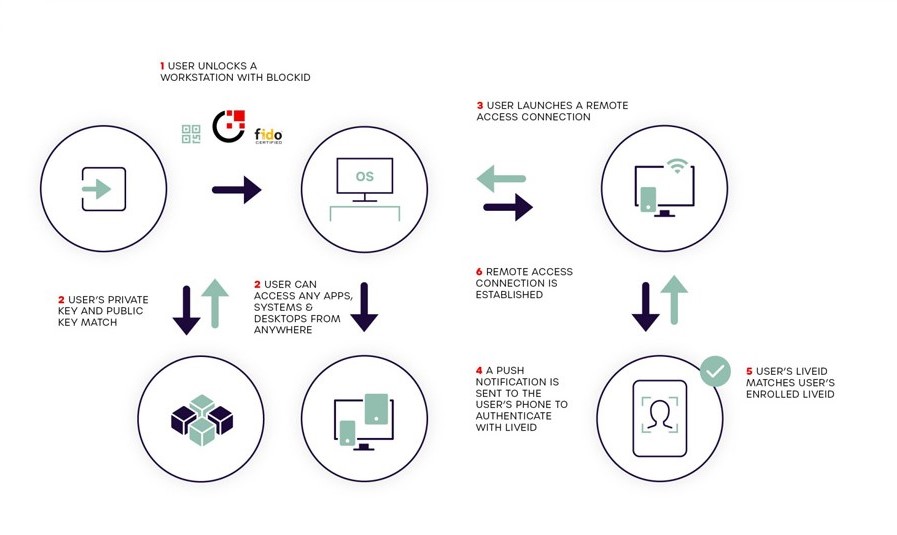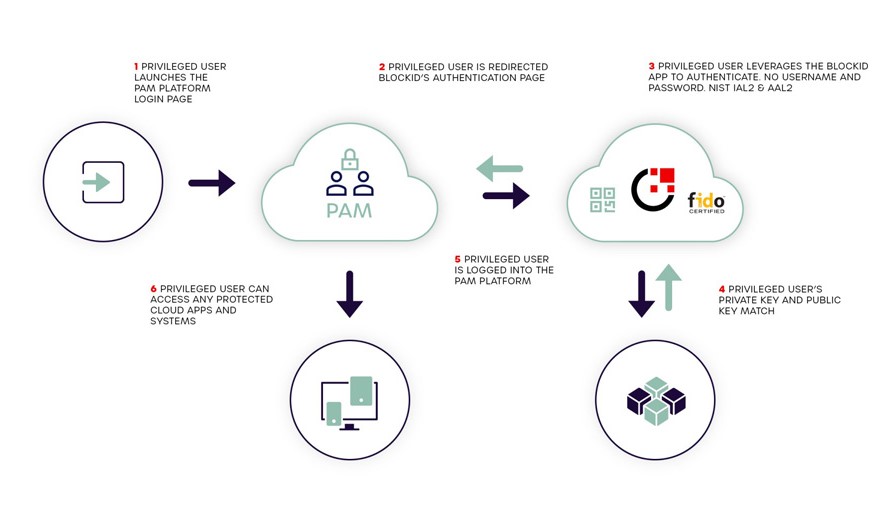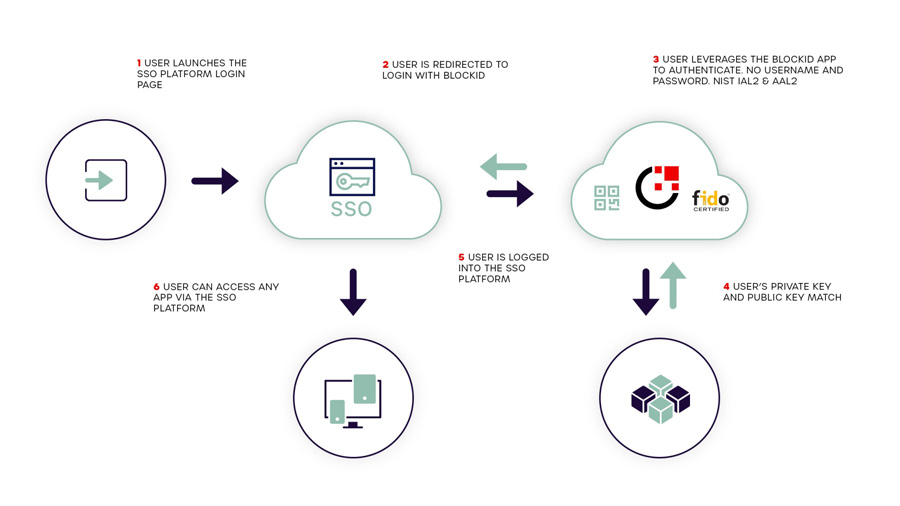Our Advantage
The 1Kosmos MFA Advantage
The 1Kosmos advantage changes the way users fundamentally authenticate. Our approach binds a user’s account to their proofed and validated identity. In doing so, 1Kosmos BlockID creates an MFA method which is identity-based. The biometric authentication delivers an IAL2 secure passwordless experience meeting the zero trust access controls. Furthermore, by implementing the advanced BlockID solution, each and every access request is completed with a multi-step MFA process that is invisible to the user. The BlockID advanced MFA process includes a user authenticating into their device, the BlockID app, public and private key pairs and LiveID (an advanced biometric). Users will utilize their trusted mobile device for daily authentication and step-up authentication for physical, logical or even offline access.
In addition to 1Kosmos BlockID identity-based biometric authentication, additional authentication methods are available. For instances where passwordless authentication is not possible or to ease users into adoption, BlockID’s 2FA and MFA authentication methods can be deployed, unifying all 2FA and MFA into one platform. Users can authenticate via any of our identification methods depending on the business need, risk profile of the activity, and security requirement for each access request.
1Kosmos Advanced MFA

MFA for Remote Access, Zero Trust Network Access
The 1Kosmos BlockID platform helps organizations transform how they currently manage identity and access requirements to provide secure remote access. BlockID delivers identity-based passwordless access to users, ensuring that only authorized employees can access data or applications regardless of where they are based. As a result, organizations will authenticate users without usernames, passwords, and one-time codes. Instead, users will authenticate with their identity. After deploying 1Kosmos, BlockID employees utilize a biometric passwordless experience and completely remove usernames and passwords. Our approach not only secures remote employees but also eliminates all password-based attacks.
BlockID is the only solution that makes Zero Trust and passwordless authentication truly compatible. The use of a password at any point during authentication does not verify the user’s identity, making it impossible. Zero Trust is not just zero passwords. NIST-certified, BlockID proofs the user’s identity who authenticates up to IAL2 per the NIST 800-63-3 Guidelines.
MFA for Privileged Account Login
BlockID allows PAM solutions to identify who accesses sensitive systems and applications, whether the privileged user is on-premise or working remotely. Under a single application, BlockID combines indisputable NIST-certified digital identity proofing MFA for Remote Access, Zero Trust Network Access Datasheet 1Kosmos Multi-Factor Authentication with advanced non-spoofable biometrics for passwordless authentication. In addition, BlockID is FIDO2 and iBeta certified for biometric passwordless access.
The privileged user experience is greatly improved since BlockID allows your admins and DevOps users to authenticate with our LiveID via their smartphone, laptop, or workstation in seconds, without passwords, with high assurance (AAL2) to remotely access key systems and applications wherever they are installed and deployed. The elimination of a password, as well as the utilization of advanced biometrics for authentication, rules out any risks related to password sharing and therefore insider threats.


MFA for SSO Login
1Kosmos BlockID modernizes MFA to improve the security of your SSO environment by eliminating password-based attacks and meeting zero trust access requirements.
What 1Kosmos brings to SSO is a more secure access environment by eliminating password-based attacks and meeting zero trust access requirements. Our identity-based authentication ties a proofed and verified identity to the access request. Meaning the user’s biometric is the authentication method. By implementing 1Kosmos users will login into their Windows, Mac, or Unix desktop MFA for SSO Login Datasheet 1Kosmos Multi-Factor Authentication with a passwordless experience using real biometrics. The authentication will verify, with high assurance, that the user is who they claim to be. Our authentication assurance is certified by NIST, UK DIATF, FIDO and iBeta and delivered with a distributed identity architecture. Our architecture delivers an immutable audit trail and meets the Zero Trust requirements for user authentication. 1Kosmos
BlockID elevates your SSO deployment so organizations will know exactly who is accessing the network meeting zero trust access standards that are otherwise unattainable.
MFA for SaaS, Webapp, Client/Server Application Login
1Kosmos BlockID easily integrates into SaaS and web applications and complies with the strictest GDPR, SOC2, ISO 27001 certification standards for handling and retention of sensitive data. In addition, MFA for Privileged Account Login Datasheet 1Kosmos Multi-Factor Authentication BlockID can also integrate into systems via industry authentication standards such as OAuth, OIDC, SAML, and FIDO and offers legacy support via RADIUS.
Mobile Authenticator
1Kosmos Block MFA and password reset functionality is available through our SDK and is easily integrated into any custom app. Whether you are using the BlockID app or a custom integration, you can implement a mobile-first MFA passwordless experience, including the advanced biometric LiveID feature.
BlockID complies with the strictest GDPR, SOC2, ISO 27001 certification standards for handling and retention of sensitive data. In addition, BlockID can also integrate into systems via industry authentication standards such as OAuth, OIDC, SAML, and FIDO and offers legacy support via RADIUS.
Once integrated, organizations will eliminate passwords and add advanced biometrics for authentication or other MFA factors as the business and use cases require.